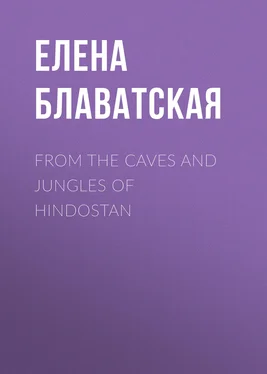Елена Блаватская - From the Caves and Jungles of Hindostan
Здесь есть возможность читать онлайн «Елена Блаватская - From the Caves and Jungles of Hindostan» — ознакомительный отрывок электронной книги совершенно бесплатно, а после прочтения отрывка купить полную версию. В некоторых случаях можно слушать аудио, скачать через торрент в формате fb2 и присутствует краткое содержание. Жанр: Путешествия и география, История, foreign_edu, foreign_antique, foreign_prose, на английском языке. Описание произведения, (предисловие) а так же отзывы посетителей доступны на портале библиотеки ЛибКат.
- Название:From the Caves and Jungles of Hindostan
- Автор:
- Жанр:
- Год:неизвестен
- ISBN:нет данных
- Рейтинг книги:5 / 5. Голосов: 1
-
Избранное:Добавить в избранное
- Отзывы:
-
Ваша оценка:
- 100
- 1
- 2
- 3
- 4
- 5
From the Caves and Jungles of Hindostan: краткое содержание, описание и аннотация
Предлагаем к чтению аннотацию, описание, краткое содержание или предисловие (зависит от того, что написал сам автор книги «From the Caves and Jungles of Hindostan»). Если вы не нашли необходимую информацию о книге — напишите в комментариях, мы постараемся отыскать её.
From the Caves and Jungles of Hindostan — читать онлайн ознакомительный отрывок
Ниже представлен текст книги, разбитый по страницам. Система сохранения места последней прочитанной страницы, позволяет с удобством читать онлайн бесплатно книгу «From the Caves and Jungles of Hindostan», без необходимости каждый раз заново искать на чём Вы остановились. Поставьте закладку, и сможете в любой момент перейти на страницу, на которой закончили чтение.
Интервал:
Закладка:
The hour of general revival has struck. Pralaya comes to an end. Everything rejoices, returning to life. The sky is separated from the waters and on it appear the Asuras and Gandharvas, the heavenly singers and musicians. Then Indra, Yama, Varuna, and Kuvera, the spirits presiding over the four cardinal points, or the four elements, water, fire, earth, and air, pour forth atoms, whence springs the serpent "Ananta." The monster swims to the surface of the waves and, bending its swanlike neck, forms a couch on which Vishnu reclines with the Goddess of Beauty, his wife Lakshmi, at his feet. "Swatha! Swatha! Swatha!" cries the choir of heavenly musicians, hailing the deity. In the Russian church service this is pronounced Swiat! Swiat! Swiat! and means holy! holy! holy!
In one of his future avatars Vishnu will incarnate in Rama, the son of a great king, and Lakshmi will become Sita. The motive of the whole poem of Ramayana is sung in a few words by the celestial musicians. Kama, the God of Love, shelters the divine couple and, that very moment, a flame is lit in their hearts and the whole world is created.
Later there are performed the fourteen acts of the drama, which is well known to everybody, and in which several hundred personages take part. At the end of the prologue the whole assembly of gods come forward, one after another, and acquaint the audience with the contents and the epilogue of their performance, asking the public not to be too exacting. It is as though all these familiar deities, made of painted granite and marble, left the temples and came down to remind mortals of events long past and forgotten.
The hall was full of natives. We four alone were representatives of Europe. Like a huge flower bed, the women displayed the bright colors of their garments. Here and there, among handsome, bronze-like heads, were the pretty, dull white faces of Parsee women, whose beauty reminded me of the Georgians. The front rows were occupied by women only. In India it is quite easy to learn a person's religion, sect, and caste, and even whether a woman is married or single, from the marks painted in bright colors on everyone's forehead.
Since the time when Alexander the Great destroyed the sacred books of the Gebars, they have constantly been oppressed by the idol worshippers. King Ardeshir-Babechan restored fire worship in the years 229-243 A.C. Since then they have again been persecuted during the reign of one of the Shakpurs, either II., IX., or XI., of the Sassanids, but which of them is not known. It is, however, reported that one of them was a great protector of the Zartushta doctrines. After the fall of Yesdejird, the fire-worshippers emigrated to the island of Ormasd, and, some time later, having found a book of Zoroastrian prophecies, in obedience to one of them they set out for Hindustan. After many wanderings, they appeared, about 1,000 or 1,200 years ago, in the territory of Maharana-Jayadeva, a vassal of the Rajput King Champanir, who allowed them to colonize his land, but only on condition that they laid down their weapons, that they abandoned the Persian language for Hindi, and that their women put off their national dress and clothed themselves after the manner of Hindu women. He, however, allowed them to wear shoes, since this is strictly prescribed by Zoroaster. Since then very few changes have been made. It follows that the Parsee women could only be distinguished from their Hindu sisters by very slight differences. The almost white faces of the former were separated by a strip of smooth black hair from a sort of white cap, and the whole was covered with a bright veil. The latter wore no covering on their rich, shining hair, twisted into a kind of Greek chignon. Their foreheads were brightly painted, and their nostrils adorned with golden rings. Both are fond of bright, but uniform, colors, both cover their arms up to the elbow with bangles, and both wear saris.
Behind the women a whole sea of most wonderful turbans was waving in the pit. There were long-haired Rajputs with regular Grecian features and long beards parted in the middle, their heads covered with "pagris" consisting of, at least, twenty yards of finest white muslin, and their persons adorned with earrings and necklaces; there were Mahrata Brahmans, who shave their heads, leaving only one long central lock, and wear turbans of blinding red, decorated in front with a sort of golden horn of plenty; Bangas, wearing three-cornered helmets with a kind of cockscomb on the top; Kachhis, with Roman helmets; Bhillis, from the borders of Rajastan, whose chins are wrapped three times in the ends of their pyramidal turbans, so that the innocent tourist never fails to think that they constantly suffer from toothache; Bengalis and Calcutta Babus, bare-headed all the year round, their hair cut after an Athenian fashion, and their bodies clothed in the proud folds of a white toga-virilis, in no way different from those once worn by Roman senators; Parsees, in their black, oilcloth mitres; Sikhs, the followers of Nanaka, strictly monotheist and mystic, whose turbans are very like the Bhillis', but who wear long hair down to their waists; and hundreds of other tribes.
Proposing to count how many different headgears are to be seen in Bombay alone, we had to abandon the task as impracticable after a fortnight. Every caste, every trade, guild, and sect, every one of the thousand sub-divisions of the social hierarchy, has its own bright turban, often sparkling with gold lace and precious stones, which is laid aside only in case of mourning. But, as if to compensate for this luxury, even the mem-bers of the municipality, rich merchants, and Rai-Bahadurs, who have been created baronets by the Government, never wear any stockings, and leave their legs bare up to the knees. As for their dress, it chiefly consists of a kind of shapeless white shirt.
In Baroda some Gaikwars (a title of all the Baroda princes) still keep in their stables elephants and the less common giraffes, though the former are strictly forbidden in the streets of Bombay. We had an opportunity of seeing ministers, and even Rajas, mounted on these noble animals, their mouths full of pansupari (betel leaves), their heads drooping under the weight of the precious stones on their turbans, and each of their fingers and toes adorned with rich golden rings. While the evening I am describing lasted, however, we saw no elephants, no giraffes, though we enjoyed the company of Rajas and ministers. We had in our box the hand-some ambassador and late tutor of the Mahararana of Oodeypore. Our companion was a Raja and a pandit. His name was a Mohunlal-Vishnulal-Pandia. He wore a small pink turban sparkling with diamonds, a pair of pink barege trousers, and a white gauze coat. His raven black hair half covered his amber-colored neck, which was surrounded by a necklace that might have driven any Parisian belle frantic with envy. The poor Raiput was awfully sleepy, but he stuck heroically to his duties, and, thoughtfully pulling his beard, led us all through the endless labyrinth of metaphysical entanglements of the Ramayana. During the entr'actes we were offered coffee, sherbets, and cigarettes, which we smoked even during the performance, sitting in front of the stage in the first row. We were covered, like idols, with garlands of flowers, and the manager, a stout Hindu clad in transparent muslins, sprinkled us several times with rose-water.
The performance began at eight p.m. and, at half-past two, had only reached the ninth act. In spite of each of us having a punkah-wallah at our backs, the heat was unbearable. We had reached the limits of our endurance, and tried to excuse ourselves. This led to general disturbance, on the stage as well as in the auditorium. The airy chariot, on which the wicked king Ravana was carrying Sita away, paused in the air. The king of the Nagas (serpents) ceased breathing flames, the monkey soldiers hung motionless on the trees, and Rama himself, clad in light blue and crowned with a diminutive pagoda, came to the front of the stage and pronounced in pure English speech, in which he thanked us for the honour of our presence. Then new bouquets, pansu-paris, and rose-water, and, finally, we reached home about four a.m. Next morning we learned that the performance had ended at half-past six.
Читать дальшеИнтервал:
Закладка:
Похожие книги на «From the Caves and Jungles of Hindostan»
Представляем Вашему вниманию похожие книги на «From the Caves and Jungles of Hindostan» списком для выбора. Мы отобрали схожую по названию и смыслу литературу в надежде предоставить читателям больше вариантов отыскать новые, интересные, ещё непрочитанные произведения.
Обсуждение, отзывы о книге «From the Caves and Jungles of Hindostan» и просто собственные мнения читателей. Оставьте ваши комментарии, напишите, что Вы думаете о произведении, его смысле или главных героях. Укажите что конкретно понравилось, а что нет, и почему Вы так считаете.












